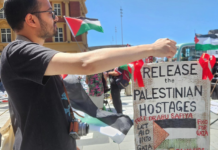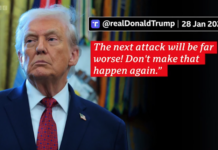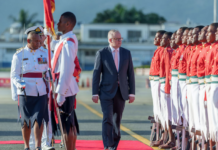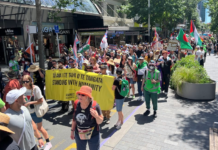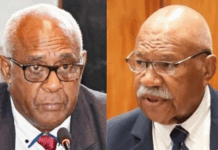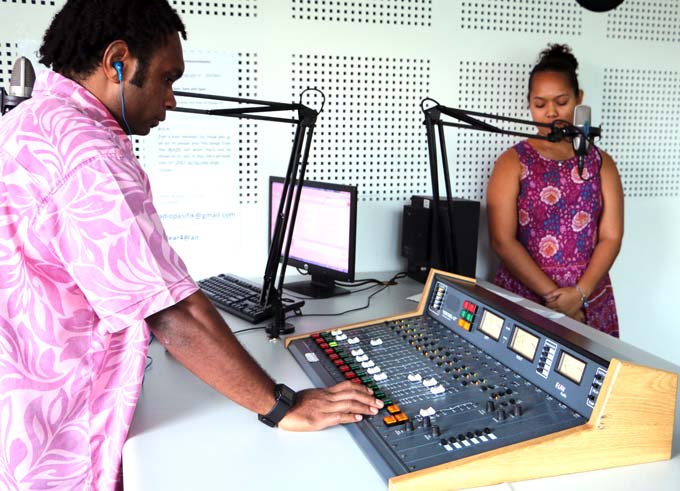
By TJ Aumua in Suva
The Pacific contingent attending the World Journalism Education Congress next week are eager to share their region’s journalism knowledge with international educators.
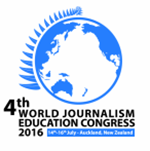 The group of Pacific educators will host a series of panel discussions at the WJEC Pacific preconference held on July 13 at the Auckland University of Technology.
The group of Pacific educators will host a series of panel discussions at the WJEC Pacific preconference held on July 13 at the Auckland University of Technology.
Eliki Drugunalevu, a journalism broadcast tutor from the University of the South Pacific in Suva, says he is excited to be presenting a panel about broadcast education in Fiji.
“Being a part of WJEC will expose me to a whole range of issues out there and I’ll be able to meet academics, researchers, journalists who have done so much contribution in this field.”
Drugunalevu, who is also manager of Radio Pasifik, says the audience could expect a thorough look at how student radio stations are offering real world journalism experience to students, which is important under Fiji’s strained media climate.
“The existence of such a facility is critical in engaging students in discussion through a broad range of community, educational and cultural programmes.”
Eddie Osifelo, a journalist from the Solomon Star, will be presenting about some of the challenges in the Solomon Islands media.
“As a journalist I have experienced harassment, verbal abuse and court challenges,” he told Pacific Media Watch.
His presentation will focus on the use of anonymous sources, particularly in political and business articles.
‘Digital divide’
Another journalism lecturer, Maria Sagrista, from Divine Word University (DWU) in Papua New Guinea, will present a discussion on the “digital divide” in PNG.
She told Pacific Media Watch that the digital divide presents many challenges for students transitioning from university to “real world” media organisations.
“The first one of them is the lack of equipment and resources at the university level that do not allow students to become familiar with the current technologies used in “real world” media organisations.”
Access to new technology is crucial for developing countries to play an active role in a knowledge-based society, she says.
“New technologies and the internet have the potential to enhance access to information for people and to bring countries such as Papua New Guinea to a position of active producers of knowledge, shifting away from the traditional role of passive silent consumers,” she says.
Other Pacific contingent members speaking at the preconference include Emily Matasororo (University of Papua New Guinea) and Dave Mandavah (Vanuatu Institute of Technology).
They are all being sponsored to attend by the New Zealand Institute of Pacific Research.
NZIPR director Toeolesulusulu Associate Professor Damon Salesa says the conference aligns with the goals of the institute by providing a place for the sharing of knowledge that will help improve the role of the Fourth Estate in the Pacific.
“It allows for the Pacific to get to know more about New Zealand and world media, and for New Zealand media to better understand the Pacific,” Toeolesulusulu says. “We are really excited and looking forward to this conference.”
Corruption and bribery
A special panel topic about corruption and the media in the South Pacific has been organised by Transparency International and will be streamed live on Asia Pacific Report.
Panelists include Alex Rheeney (editor-in-chief of the Post-Courier in PNG), Dr Shailendra Singh (USP) and Kalafi Moala (Taimi ‘o Tonga media group and deputy chair of the Pasifika Media Association-PasiMA)
Transparency International New Zealand’s Fuimaono Tuiasau, the Pacific director, says the forum enables TINZ to support Pacific journalists in their work to tell stories about corruption and bribery.
“We hope to highlight to an international audience the role of he media in the Pacific and the challenges that face media organisations and to expose those at the forefront to an international audience.”

Fuimaono says corruption and bribery should be a topic introduced into journalism education and training so the media can develop the skills necessary to tell these stories.
- Register for the preconference here.
- Strong Asia contingent lined up for WJEC
- Pacific preconference webpage
- WJEC website


